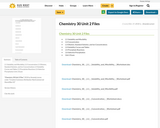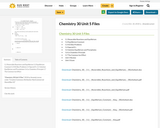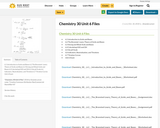
Final Exam Word and Notebook file
- Subject:
- Chemistry
- Science
- Material Type:
- Assessment
- Unit of Study
- Date Added:
- 10/17/2018

Final Exam Word and Notebook file

2.1 Introduction to Molecules and Compounds
2.2 Ionic Compound Nomenclature Worksheet & Answer Key
2.3 Covalent Compound Nomenclature notes & Assignment
2.4 Acid-Base Nomenclature Worksheet, Assignment Questions & Quiz
2.5 Writing Chemical Formulas Assignment & Worksheet
2.6 Lewis Structures notes & Worksheet
2.7 VSEPR Theory notes & Worksheet
Unit 2 Exam
Unit 2 Exam Rewrite

3.1 The Law of Concervation of Mass and Chemical Equations- Worksheet 1,2 and Keys
3.2 Types of Chemical Reactions Worksheet and Assignment
3.3 Net Ionic Equations Worksheet and Assignment
Unit 3 Exam
Unit 3 Exam Rewrite

The Law of Conservation of Mass and Chemical Equations
Types of Chemical Reactions Notes & Worksheets
Net Ionic Equations
Unit 3 Review

4.1 Dimensional Analysis
4.2 The Mole and Molar Mass
4.3 Counting Atoms
4.4 Mole to Liters and Putting it all Together
4.5 Percent Composition
4.6 Empirical Formulas
4.7 Mole to Mole Stoichiometry
4.8 Mass Stoichiometry
4.9 Gas Stoichiometry
4.10 Limiting Reagants
4.11 Percent Yield
Unit Review
Exam & Rewrite Exam

4.1 Dimensional Analysis
4.2 The Mole and Molar Mass
4.3 Counting Atoms
4.4 Mole to Liters and Putting it all Together
4.5 Percent Composition
4.6 Empirical Formulas
4.7 Mole to Mole Stoichiometry
4.8 Mass Stoichiometry
4.9 Gas Stoichiometry
4.10 Limiting Reagants
4.11 Percent Yield
Unit Review

5.1 General Characteristics of Gases and Pressure
5.2 The Simple Gas Laws I - Boyle's Law
5.3 The Simple Gas Laws II - Charles's Law
5.4 The Ideal Gas Equation
5.4 The Ideal Gas Equation - Solutions
5.5 Dalton's Law of Partial Pressure
Unit 5 Exam - Formula Sheet
Unit 5 Exam - Outline

5.1 General Characteristics of Gases and Pressure
5.2 The Simple Gas Laws I - Boyle's Law
5.3 The Simple Gas Laws II - Charles's Law
5.4 The Ideal Gas Equation
5.4 The Ideal Gas Equation - Solutions
5.5 Dalton's Law of Partial Pressure
Unit 5 Exam - Formula Sheet
Unit 5 Exam - Outline

1.1 Compounds and Formulas
1.2 Chemical Reactions
1.3 Mole Theory and Stoichiometry
Unit 1 Exam

1.1 Compounds and Formulas
1.2 Chemical Reactions
1.3 Mole Theory and Stoichiometry

2.1 Solubility and Miscibility
2.2 Concentration
2.3 Dilution, Standard Solution, and Ion Concentrations
2.4 Solubility Curves and Tables
2.5 Precipitate Reactions
2.6 Selective Precipitation
Unit 2 Exam

2.1 Solubility and Miscibility
2.2 Concentration
2.3 Dilution, Standard Solutions and Ion Concentration
2.4 Solubility Curves and Tables
2.5 Precipitate Reactions
2.6 Selective Precipitation

The Concept of Energy
Energy Changes
Enthalpy and Heat of Formation
Hess's Law
Hess's Law Equation
Bond Enthalpies
Spontaneity, Stability of Compounds, and Entropy
Gibbs Free Energy
Unit 3 Exam

The Concept of Energy
Energy Changes
Enthalpy and Heat of Formation
Hess's Law
Hess's Law Equation
Bond Enthalpies
Spontaneity, Stability of Compounds, and Entropy
Gibbs Free Energy

Reaction Rates
The Collision Theory and the Rate Determining Step
Potential Energy Diagrams
Factors that Affect Rates of Reactions
Unit 4 Exam

Reaction Rates
The Collision Theory and the Rate Determining Step
Potential Energy Diagrams
Factors that Affect Rates of Reactions

5.1 Reversible Reactions and Equilibrium
5.2 Equilibrium Constant
5.3 ICE Box Problems
5.4 Special K's
5.5 Solution Equilibrium and Precipitates
5.6 Le Chateliers Principle
5.7 The Common Ion Effect

5.1 Reversible Reactions and Equilibrium
5.2 Equilibrium Constant
5.3 ICE Box Problems
5.4 Special K's
5.5 Solution Equilibrium and Precipitates
5.6 Le Chateliers Principle
5.7 The Common Ion Effect

6.1 Introduction to Acids and Bases
6.2 The Bronsted- Lowry Theory of Acids and Bases
6.3 Strong and Weak Acids and Bases
6.4 Calculating H3O and OH
6.5 the pH Scale
6.6 Indicators, Neutralization, and Titrations
6.7 Titration Curves
Unit 6 Exam

6.1 Introduction to Acids and Bases
6.2 The Bronsted- Lowry Theory of Acids and Bases
6.3 Strong and Weak Acids and Bases
6.4 Calculating H3O and OH
6.5 the pH Scale
6.6 Indicators, Neutralization, and Titrations
6.7 Titration Curves
Unit 6 Exam